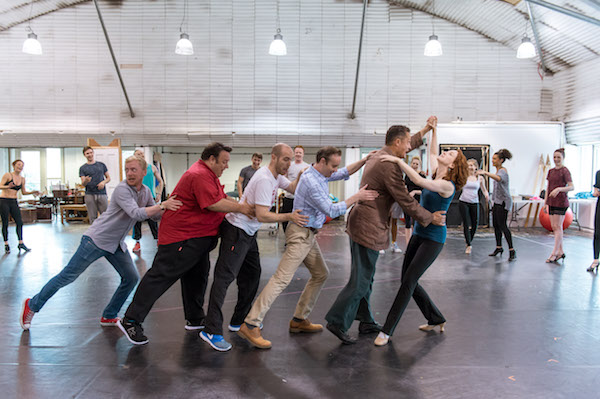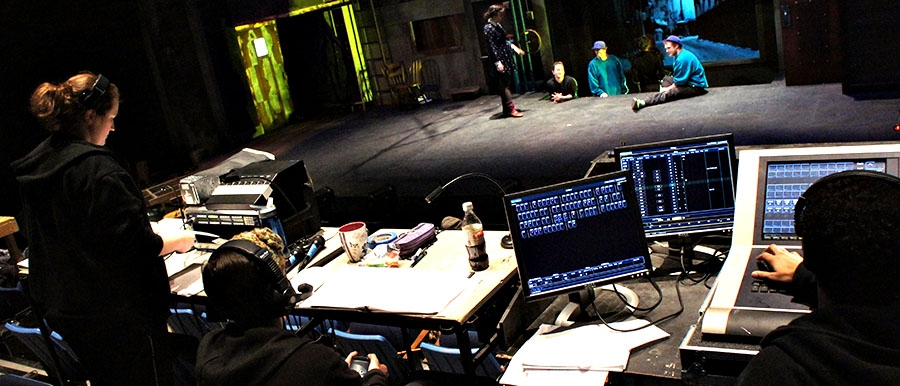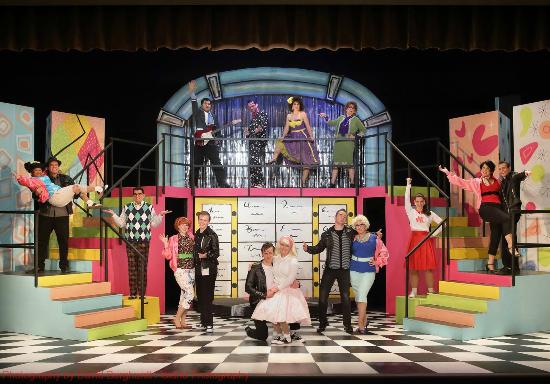Yes, that’s your name up on that list! It doesn’t matter if you are 16 or 60 — going out for a role for community theatre can be daunting, especially when you aren’t sure what to expect. Creative teams will often assume members already know what’s required of them and won’t spell it out.
To help you out, here is our advice for community theatre first-timers:
Auditions

1. Avoid picking a song from the show for which you are auditioning. Choose something that showcases your vocals and acting ability.
2. Come prepared with everything they’ve asked for and more. Having a second song ready can be helpful, just in case.
3. Wear something that makes you feel comfortable and confident. It will help steady your nerves.
4. If there is a dance audition, make sure you have proper attire and don’t hide in the back. They can’t cast you if they can’t see you.
5. Don’t let the talent of the other auditionees psyche you out. You never know what the creative team is looking for, and it might be something you have!
Rehearsals

1 Show up on time. This cannot be stressed enough. You are a part of a team. Being late without an exceptional reason gives the impression you feel your time is more valuable than others’.
2. If you are sick or can’t make it, be sure to contact your director. They don’t need to waste rehearsal time tracking you down. If you are an integral part of that session’s rehearsal, they might use the advance notice to alter the rehearsal and work on something else instead.
3. When you miss a rehearsal, take the initiative to find out what you missed and get caught up before the next rehearsal.
4. Always have a pencil on hand. You will need to jot down stage directions and notes as they happen. Don’t leave it until the end of rehearsal, or you may forget things. The creative team will be annoyed if they have to tell you a second time.
5. Whether you’re playing the leading role or a mute tree, give it 100 percent. Every person who is part of the show is integral to the finished product. If you want to earn larger roles, show the creative team you can handle more by being the best at whatever you’re given and doing it with a smile.
6. There will be regulars and already established friend groups. Don’t let it intimidate you. If it does, find other newbies in the cast and start there. Then, get to know everyone as you work on scenes together. Just being friendly and saying hello goes a long way.
7. Another way to bond with members of the production and get involved is to help out with backstage tasks when you have downtime. Making props, helping build or strike the set, marking up the floor or even just tidying up the stage or rehearsal space are all good options.
8. Every production has drama going on backstage and onstage. Try to stay out of it. If you find yourself involved, diffuse the situation to the best of your ability. Keeping the group as cohesive as possible will ensure the best performance onstage.
9. In some companies or groups, you will be required to provide your costumes. Establish that as early as you can and start hunting for those perfect pieces. Don’t leave it to the last minute, or you may end up disappointed.
10. If you are responsible for getting your own costumes, be sure the director approves of all your choices. Don’t wait for them to see the costumes onstage during dress rehearsal. If they tell you what you chose isn’t going to work, you’ll be left scrambling at the last minute.
11. You will be expected to practice and review on your time. Showing up to a rehearsal unprepared is unfair to your fellow castmates and the creative team. Block out a small pocket of time a few times a week to go over what you’ve learned.
12. Ask questions if you are confused or need something repeated. Don’t be embarrassed — someone else may have the same question and is also afraid to speak up. Giving a poor performance will be far more embarrassing, so get clarification if you need it.
13. If you have a conflict, speak to that person directly, if you can, or take it to the director. Avoid spreading gossip at all costs. The worst thing you can do is talk to someone else in the cast. The more people involved, the bigger the problem gets.
14. Don’t take constructive criticism of your performance personally. A lot of first-timers will get upset if the director or choreographer corrects them or asks them to change what they’re doing. They are just trying to make the show the best it can be, and their approach may not be the same as yours. Keep your chin up, listen to what they are saying and take everything in stride.
15. Make sure you warm up before every rehearsal. There may not always be time to warm up as a group, so leave yourself a few moments to stretch your limbs and vocal chords.
16. Keep the diva moments to a minimum. Respectfully voicing your ideas to members of the creative time is fine, but it’s ultimately up to them to decide how the show is put on.
17. It is good to try new things and grow as an artist, but if you are really uncomfortable with something, speak to the director about it. Most are very accommodating and will do their best to rework it.
18. Be patient. There will be a fair bit of standing around and waiting for others. Keeping a positive attitude will help maintain a pleasant and creative environment.
Tech Week

1. Tech week is grueling. Go into it with that in mind, and you will avoid an unpleasant surprise.
2. Be patient. There are a lot of elements at play, and everyone is tired and on edge. Emotions run very high during this period, and a little bit of patience can go a long way toward avoiding a major incident.
3. Stay positive. Tech week rehearsals are notorious for having everything go wrong that can, but 99 percent of the time, it all turns out okay in the end.
4. Stay focused. There will be a lot going on, and this is when injuries can happen. Adding set pieces, costumes, props, lighting and sound can cause a lot of confusion. There will be people everywhere. Be aware of your surroundings, and don’t get distracted by what others are doing.
5. Do everything you can to stay healthy. The stress, rehearsals and physical demands will take their toll on you. Be preventative by doing things that keep you relaxed, drinking lots of water, resting when you can, taking vitamins and staying warm.
6. Do not schedule anything social during this week. You will not make it to that. Tech week is very demanding, and adding commitments will just add to your stress.
7. Keep your area of the dressing room as neat and organized as you can. Quick changes are a recipe for lost items, so try to have designated places for your things. A storage container for makeup and hair items, a bag for shoes, a bag for laundry, your own hangers and clothing bag for costumes and a general bag or suitcase to store it all in can be beneficial.
8. Make sure you label all your things with your name or initials. That way, if they are misplaced, you’re more likely to recover them.
9. Bring your own small mirror. There are never enough mirrors for everyone, and you’ll need one.
10. Always have water on hand. It gets extremely warm onstage and in dressing rooms, and the last thing you want is to pass out or get sick from dehydration.
11. If you can, do as much preparation at home before you go to the theatre. It will help you stay relaxed among the backstage frenzy.
Performance

1. Invite your friends and family as soon as you know the date of the show. Booking people ahead of time will ensure you have some friendly faces in the crowd to give you that extra energy during the performance.
2. Promote your show as much as you can. Tell everyone you know and advertise it on your social media. The more people there are in seats, the better it is for the group.
3. If something goes wrong or you mess up, don’t let it break your focus. Treat it like it was intentional and keep going. It’s unlikely the audience will even realize or remember.
4. Give every performance as much energy as opening night. Most people in the crowd will be seeing the show for the first time and deserve the best performance possible.
5. Keep track of your cues. It’s easy to get distracted backstage, and there’s nothing worse than an angry stage manager tracking you down.
6. Treat your backstage crew with respect. They are the unsung heroes of every show, work just as hard as the cast onstage and are often unrecognized for their contributions. Be sure to thank them when you see them around.
7. Don’t eat in your costume. If your stage manager finds out, you’ll live to regret it.
8. Use the bathroom before the show starts and at intermission. It sounds silly, but it can mess up your focus if you need to go. Plus, trying to go to the restroom with your costume on can be really tough.
9. Nerves are completely normal and expected. Try to channel that energy into each performance. Keep yourself from freaking out by taking everything one step at a time, one scene at a time. Breaking it down into smaller chunks will make it less frightening and more manageable.
10. Don’t freak out if the audience doesn’t laugh or react when they are expected to. Some audiences are more reactive than others. It doesn’t mean they didn’t find it funny or enjoyable — they might just be more reserved theatergoers.
11. When it’s all over, be sure to thank everyone involved. Appreciation is always remembered.
It’s easy to get caught up in the chaos of community theatre, but before you know it, the show will close its last performance. Whether it’s your first show or your 20th, try to enjoy each moment and each experience for what it is: pure magic.







11 Comments
Leave a Reply2 Pings & Trackbacks
Pingback:21 Problems Only Community Theatre Actors Understand - Theatre Nerds
Pingback:Farewell to A BRONX TALE: Parting Advice from the Show’s Original Cast Members - Camp Broadway